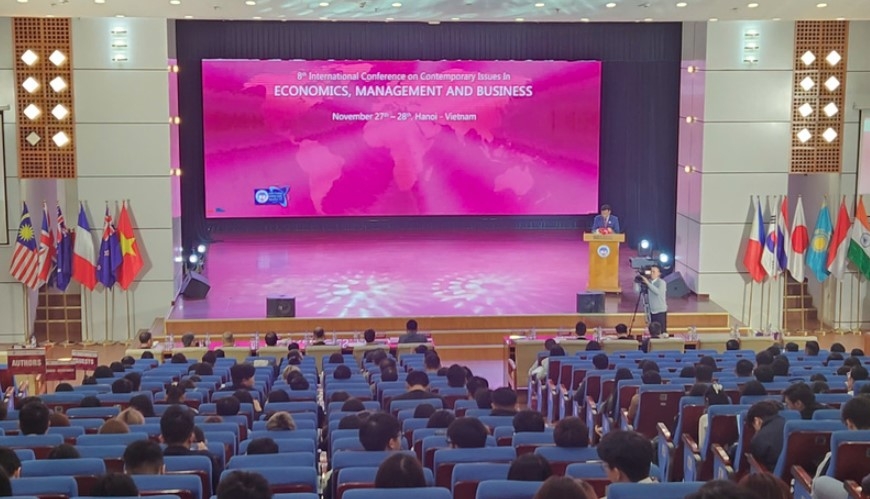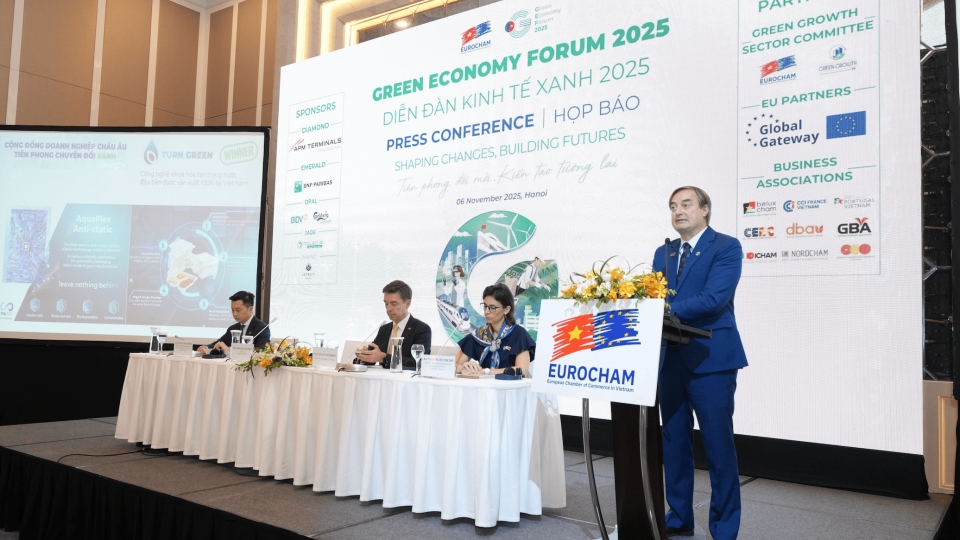Conference highlights challenges to Vietnam’s economy amid global turbulence
VOV.VN - The National Economics University (NEU) and the Australian National University (ANU), jointly held an international conference in Hanoi on November 27–28 to identify major challenges confronting Vietnam’s economy in an increasingly volatile global trade and economic environment.

The conference, titled “Contemporary Issues in Economics, Management and Business” (CIEMB 2025), attracted hundreds of participants, including economists, policy-makers, and scholars from universities and research institutes across Vietnam and from countries such as the UK, India, New Zealand, France, Japan, the Republic of Korea, Indonesia, Thailand and Australia. With 22 parallel discussion sessions, the event served as a significant platform for academic exchange and for addressing pressing economic issues directly impacting Vietnam’s development orientation.
In the opening remarks, Bui Duc Tho, Chairman of the NEU Council, emphasised that Vietnam is entering a “golden period” for economic research and policy formulation. He noted that data availability, increasingly complex research topics, and the broader impact of academic studies make high-quality research essential for shaping long-term strategies. CIEMB, he stressed, is not just an academic gathering but a forum that contributes to the country’s future development vision.
At the conference, international experts highlighted multiple concerns regarding the current global economic context. Professor Shiro Armstrong (ANU) drew attention by citing a controversial quote from US President Donald Trump “Tariff is the most beautiful word in the dictionary” to illustrate the resurgence of protectionism worldwide. The professor warned that ongoing tariff retaliation among major economies is creating a spiral of global trade decline.
Given Vietnam’s strong dependence on exports, such turbulence could directly affect its growth prospects. He underscored that Vietnam must continue championing free trade, reducing non-tariff barriers, and fully implementing commitments under the Regional Comprehensive Economic Partnership Agreement (RCEP), the Comprehensive and Progressive Agreement for Trans-Pacific Partnership (CPTPP), the World Trade Organisation (WTO) and bilateral free trade agreements (FTAs).
He underlined the need to draw China further into the shared rules-based system rather than allowing it to build a separate one, noting that doing so would make Asia the world’s largest and most open free trade area.
Addressing Vietnam’s internal challenges, Dr. Jochen M. Schmittmann, IMF Resident Representative for Vietnam, Cambodia and Laos, acknowledged Vietnam’s strong growth potential, even suggesting the possibility of achieving double-digit growth in the future. However, he also highlighted several structural issues that could become significant obstacles if left unresolved.
In the near term, Vietnam should adopt a cautious monetary stance amid excessive credit growth, while giving priority to reinforcing banking system safety, resolving bad debt, and bolstering capital buffers, he said.
With public debt still low, fiscal space remains ample, allowing Vietnam to prioritise infrastructure investment, especially in digital infrastructure, logistics, and energy, while ensuring project quality and avoiding fragmentation or inefficiency, he added.
Simultaneously, he recommended accelerating reforms of the financial system and business sector, allocating capital based on market signals, reducing state-owned enterprises (SOEs)’ privileges, creating fair competition for private firms, and minimising distortions in labour and credit markets.
The parallel sessions further discussed issues such as global supply chain shifts, digital economy development, green growth models, climate change impacts, economic governance transformation, and strategies for strengthening national competitiveness.




